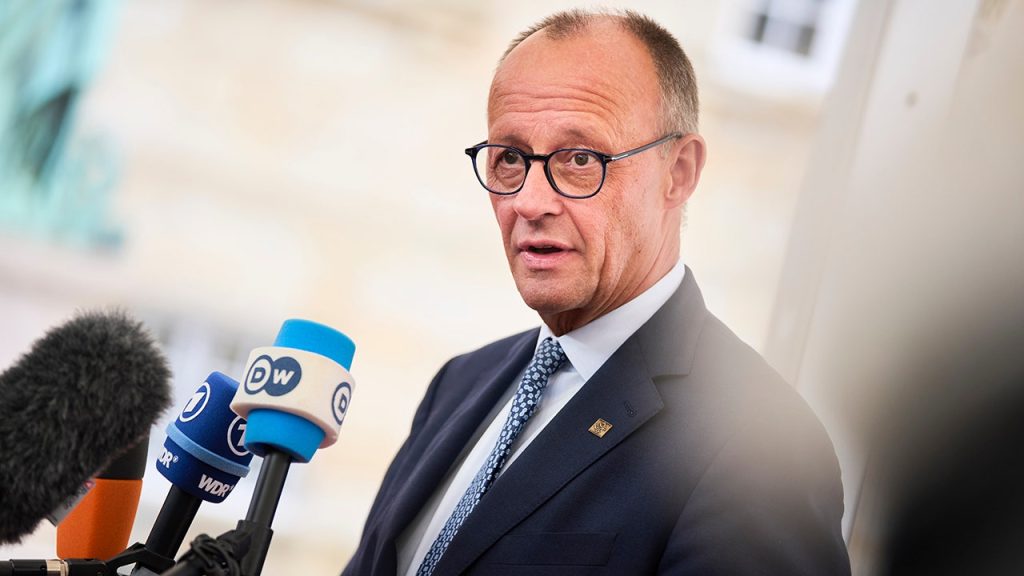Merz Stands Firm on Migration Concerns Amid Public Safety Debate
In recent statements that have ignited controversy across Germany, Chancellor Friedrich Merz has reinforced his position on migration issues, specifically highlighting what he perceives as growing public safety concerns. During a visit to Potsdam last week, Merz addressed the government’s approach to illegal immigration, stating, “We still have this problem in the cityscape,” while referencing the federal interior minister’s efforts to facilitate large-scale deportations. These comments emerged against the backdrop of increasing tensions regarding immigration policy in Germany, a nation that has historically struggled with balancing humanitarian responsibilities and domestic concerns.
The Chancellor’s remarks sparked immediate criticism from various political circles, with some accusing him of racist undertones. Merz, however, firmly rejected these allegations while attending a summit on the Western Balkans in London. He offered a nuanced perspective, acknowledging that migrants constitute “an indispensable part of our labor market,” according to German news outlet DW News. This balanced recognition demonstrates the complexity of Germany’s relationship with immigration – appreciating its economic benefits while confronting perceived challenges. Despite this acknowledgment, Merz maintained his core concern, asserting that many Germans and Europeans feel “afraid to move around in public spaces” because of certain migrants “who do not have permanent residence status, do not work and do not abide by our rules.”
When pressed about potentially withdrawing his controversial statements, the Chancellor remained resolute, offering a personal challenge to his critics: “I don’t know whether you have children. If you do, and there are daughters among them, ask your daughters what I might have meant. I suspect you’ll get a pretty clear and unambiguous answer. There’s nothing I need to retract.” This direct appeal to parental concerns about safety, particularly regarding young women, represents Merz’s attempt to ground his political position in what he perceives as everyday realities faced by German families. By framing the issue through this personal lens, he seeks to move the debate beyond political rhetoric into the realm of lived experience.
The Chancellor’s comments have not gone unchallenged. A petition disputing Merz’s characterization has gained significant traction, with prominent signatures from public figures including actor Marie Nasemann and well-known environmental activist Luisa Neubauer. This public pushback illustrates the deeply divided perspectives on immigration and public safety within German society. Neubauer, in particular, articulated a powerful counterargument on Instagram, writing, “There are approximately 40 million daughters in this country. We have a genuine interest in ensuring that our safety is taken seriously. What we are not interested in is being misused as a pretext or justification for statements that were ultimately discriminatory, racist and deeply hurtful.” Her words capture the frustration felt by many who see Merz’s comments as exploiting legitimate safety concerns to advance restrictive immigration policies.
This heated exchange occurs against a backdrop of significant political challenges in Germany, where the government faces multiple pressures both domestically and internationally. The country continues to navigate the aftermath of Angela Merkel’s momentous decision to welcome over a million refugees in 2015, a policy that has shaped German politics ever since. Current economic uncertainties, combined with rising right-wing populism across Europe, have created a volatile political environment where discussions about immigration frequently become flashpoints for broader societal tensions. Chancellor Merz appears to be positioning himself as responding to genuine public concerns while attempting to prevent further political shifts toward extreme positions on immigration.
The ongoing debate highlights fundamental questions about German identity, values, and the future direction of European immigration policy. While Merz emphasizes public safety concerns and the integration challenges posed by some migrants, his critics argue that such framing unfairly stigmatizes entire communities and undermines Germany’s commitment to diversity and inclusion. Both perspectives reflect genuine concerns: the importance of public safety and social cohesion on one hand, and the dangers of discrimination and the need to protect vulnerable populations on the other. As Germany continues to wrestle with these complex issues, the country faces the difficult task of finding balanced policies that address legitimate security concerns while upholding its humanitarian commitments and avoiding harmful stereotyping of immigrant communities. This tension between security and openness remains at the heart of not just German politics, but broader European debates about immigration, identity, and the future of multicultural societies.


